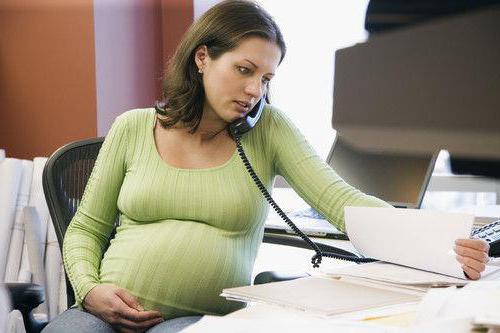Today, through the legislation of the Russian Federation, it is possible to maintain the health of a pregnant woman and, of course, her unborn baby directly through labor protection. Light labor is fixed for pregnant women in the Labor Code of the Russian Federation and consists in the formation of special working conditions. They, of course, contribute to a healthy and harmonious intrauterine development of the fetus.
It is important to add that through the Labor Code, the future mother is assigned not only the right to easy work, but also specific guarantees of the financial plan, as well as the preservation of the workplace. What is easy labor for pregnant women? How long is the transfer appropriate? Why? You can find answers to these and other, no less interesting questions in the process of reading this article.

Easy work for pregnant women (Labor Code of the Russian Federation)
In the modern world, a woman most often prefers not to inform the employer directly about the onset of pregnancy. Why? Most likely, she is afraid of losing her job. However, the conditions under which the workflow proceeds are often unfavorable for the formation and subsequent development of the fetus.
It’s no secret that any woman sincerely wants to give birth to a healthy baby, so every expectant mother must know what easy labor is for pregnant women (this is very clear for the Labor Code of the Russian Federation). In addition, you should have information on the payment of such labor activities. By the way, today women often ask themselves: what to do if the employer does not have the necessary conditions for the harmonious development of the fetus?
What are the rights of a pregnant woman to light work today? It is important to note that in accordance with the Russian Labor Code, no specific definition of light labor during pregnancy is specified. However, the obligation of the employer in the case of the availability of an opinion of the medical service in a certain way to reduce production standards is legislatively fixed. In addition, it is also possible to ensure that the pregnant woman is transferred to light work (the application provided for by this provision is made in writing directly to the pregnant woman), eliminating the influence of some negative factors of production.
Typically, these can harm both a woman and her unborn baby. It is important to note that in the case of a transfer, the average earnings per employee are provided for. Thus, light work involves activities of a professional orientation that require less cost in terms of physical strength and do not have an adverse effect directly on the development of the fetus.

List of restrictions
As it turned out, easy labor for pregnant women (Labor Code of the Russian Federation) implies certain working conditions. So, the fair sex, who is expecting a baby, is prohibited from performing the following activities:
- Lifting certain objects from the floor above the shoulders.
- Weight lifting.
- Work for pregnant women in accordance with the conveyor production process is prohibited.
- The implementation of labor under the condition of neuro-emotional stress.
- Work with pathogens of various kinds of diseases (fungi, parasites, infections, viruses).
- The implementation of labor activities in the premises where toxic substances are located.
- Work for pregnant women with infrared radiation is prohibited.
- Labor activity subject to pressure drops.
- Work with a high degree of radiation and so on.
It is important to add that the transfer of pregnant women to light work is carried out strictly upon providing the employer with a medical opinion. Without this document, the employer is not obligated to change the working conditions of his employee.

Rights and obligations
As it turned out, the main responsibility of the employer regarding the issue under consideration is the transfer of pregnant women to another job, provided that they provide appropriate medical conditions. Then, when the employer is not able to immediately provide the pregnant woman with favorable working conditions, and he needs a certain period of time to resolve this situation, the employee, one way or another, must be relieved of work for this time. In this case, the employer undertakes to pay absolutely all days of its absence.
In addition, the relevant production norms suggest that a pregnant woman is entitled to full leave, subject to annual payment. It is interesting to add that here it does not matter at all how much time a woman worked in a particular company. Thus, the employer must provide the employee with such leave directly at her request, or before or after maternity leave.
Considering light work for pregnant women, the Labor Code suggests that the employer must ensure that sanitation is observed at the pregnant woman’s workplace. In addition, the law guarantees its retention for an employee in a position. Why? The fact is that the employer is not entitled to break off labor relations with her on his own initiative. If the period of the employment contract ends, then immediately upon the application of the employee, the employer undertakes to extend this agreement.

Industrial Conditions
In accordance with Art. 254 of the Labor Code of the Russian Federation, the work of a pregnant woman, one way or another, must be coordinated with certain conditions. Thus, in the industrial field, if the labor activity relates to assembly, sorting, packaging, all necessary operations must necessarily be subject to automation. At the same time, the employer undertakes to provide sufficient lighting in the room to avoid over-exertion of the employee's eyes and other employees. It is important to note that light work directly during pregnancy in any case should exclude an increased degree of emotional and psychological stress.
It should be noted that an employee of a company, who is in a position, should not carry out labor activities in a draft, when pressure drops are sharp, as well as in conditions of wet clothes. In addition, harmful aerosols, chemicals, ultrasound and vibration should never affect it. An employee of an enterprise in a position is strictly forbidden to develop activities that, in one way or another, come into contact with various pathogens of diseases (infections, fungi, and so on).

Heavy work conditions
In accordance with Art. 254 of the Labor Code of the Russian Federation, the employer is obligated to provide such kind of working conditions that completely eliminate the need for a worker in a position to always be in the same position (standing, sitting, and even constantly walking is strictly forbidden). Moreover, you cannot work on your knees, squatting, bending over, as well as focusing on your stomach or chest.
The professional work of a pregnant woman cannot be associated with lifting certain items above the shoulders from the floor, as well as with muscle tension in the abdomen.So, a pregnant employee of a company can pick up items weighing no more than two and a half kilograms, no more than twice an hour. If it is impossible to comply with such a periodicity due to other technological conditions, it is necessary to reduce the weight by half. However, within sixty minutes, the total weight should be no more than six kilograms. Thus, for a work shift, the total mass should in no case exceed forty-eight kilograms.
General working conditions
It is important to note that in the case of a pregnant woman performing piece-rate work, production rates are reduced by forty percent. It is important to add that in such circumstances, the payment of light labor due to the special situation of an employee of a company does not decrease.
By the way, if a representative of the fair sex carries out labor activities at an agricultural enterprise, then one way or another, she should be relieved of duties on animal husbandry and crop production. Moreover, the above rule takes effect immediately from the moment of medical confirmation of pregnancy.
It is interesting to know that office working conditions presuppose that a woman in a position has the right not to work with computer equipment. If it is impossible to provide such a condition, then it is necessary to reduce labor time to three hours a day. By the way, for pregnant employees respecting themselves and company employees, as a rule, a corrugated footrest, as well as a chair that fully meets certain parameters, is provided. Among them are a rotating mechanism, the presence of a headrest, armrests, as well as a high back, which must be regulated in terms of height.

Features of work
In accordance with the above information, it is possible to identify a number of features of the work of a woman who is in a position that includes:
- The right to switch to light working conditions (this requires a medical certificate).
- The right not to work with computer equipment.
- Easy work for pregnant women: how many hours do you need to work? The answer to this question is formed directly from the possibility of a woman moving to an incomplete work schedule. It is important to add that in this case, the payment is made proportionally in accordance with the hours worked. By the way, the work schedule does not have any effect on the duration of the vacation, which is a very pleasing fact for employees of certain companies in position.
- The right to receive payment for the days when a woman was forced to skip. This rule is implemented when the employer delays in ensuring the proper working conditions for the pregnant employee.
- The right to refuse to work on night shifts and business trips to other cities. In addition, if desired, the woman may be from overtime work, as well as from work on holidays and weekends.
- The right to receive full leave regardless of the length of service in the company.
What else?
An important fact is that a pregnant woman cannot be dismissed at the request of the employer even when she did not inform the employer of her own situation when applying for a job. If the employee was accepted for a specific period, but the employment contract expired, all she had to do was apply directly to extend this agreement and, of course, attach a medical certificate that confirms the presence of pregnancy. So, the employer has the right to dismiss the employee only after the expiration of the period within a week when, in relation to her, the employment contract is no longer relevant.
Interestingly, there is only one case where the dismissal of a pregnant woman may be legal. So, an employee can be dismissed if the conclusion of an employment contract with her was relevant only for the period of fulfilling the duties of the employee, who was temporarily absent from the workplace. However, under such circumstances, the employer undertakes to offer the pregnant woman all vacancies that are free and suitable for her in her position. In the absence of such, the dismissal of an employee is permissible.

Terms of payment
After a pregnant woman submits a medical report on the need for easy labor, the employer agrees to exclude conditions of this kind that could adversely affect the health and development of the fetus and the employee herself. It is important to add that in the case of a transfer to another job, the salary part of such a woman’s wages may differ slightly and, most likely, not in a direction favorable to her. Easy work for a pregnant woman is endowed with special payment conditions. So, the employer must act as follows:
- Then, when the salary formed by the staffing level at the new workplace is lower than the previous one, the difference is set as a bonus so that it becomes possible to pay a full salary.
- Then, when the salary is higher at the new workplace, in any case, full salary is payable.
- Then, when the employee remains at the same workplace subject to a decrease in workload, wages are paid in the amount of the average for the previous period of time.
It is worth adding that a pregnant woman has the right to express her own desire to work on the condition of a part-time day or week. This rule is enshrined by the legislation of the Russian Federation. In such a case, the employer undertakes to pay the employee's labor in proportion to the hours worked. In addition, the loss of the employer, which, in one way or another, is associated with the remuneration of pregnant women, is debited to his account. So, the FSS has the right not to reimburse any expenses.
Useful Tips
Then, when the working conditions of a woman in position, provide for some restrictions in terms of drafts, work posture, wet shoes and clothes, atmospheric pressure drops, inadequate lighting, elevated temperature (more than thirty-five degrees), then she is given the absolute right to switch to more easy work.
So, it is imperative to apply to the antenatal clinic for the issue of a medical report, and then submit this certificate directly to the employer. At the same time, you need to know that you do not need to negotiate with the tenant. Such a translation is not a gesture of goodwill, and is nothing but a direct obligation of the employer. If the employer confirms the impossibility of the procedure and offers to quit from his lips, the woman should understand: it is illegal and, accordingly, take appropriate measures to protect her rights.